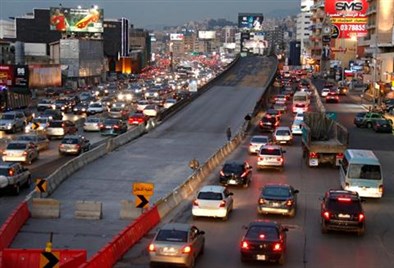source:www.dailystar.com.lb
More than a year after the dismantlement of the Jal al-Dib bridge north of Beirut, plans to construct a tunnel to replace the structure are at a standstill. Area residents are spending the better part of their time waiting for a decision from a government largely in limbo, while refusing to get used to the idea that their Metn town still lacks an entrance from and exit to the southbound side of the main coastal highway.
The Jal al-Dib bridge was dismantled last year after various officials said it was at risk of collapsing, although a number of engineers had said it was still in good condition. The call to demolish the bridge, which had been built shortly after the start of the Civil War in 1975, came after the collapse of an approximately 40-year-old building in Ashrafieh, killing more than two dozen people.
However, the bridge was dismantled before any alternative plans were proposed, compelling many of the town’s residents to hold weekly protests in demand for a substitute.
Jal al-Dib resident Malake Abou Jaoude said she attended all the protests in the hope of prompting the government to come up with a plan for another bridge.
“I went to the protests as my family’s representative and as a lifelong citizen of this town,” she said. “How could they dismantle the bridge without offering an alternative in the first place? Even now, no one really knows what’s going on. The tunnel project is not a sure thing, so we’re just waiting.”
Shortly after the dismantlement of the bridge, a group of six local engineers decided to work on an underpass which, although requiring months of construction, would provide traffic from the north with access to Jal al-Dib and alleviate traffic from neighboring towns.
After drawing up the plans, they met with the Council of Development and Reconstruction, which was given the responsibility of conducting the necessary engineering studies to be presented to the Cabinet for approval.
Months later, it seemed the tunnel was good to go, and the Cabinet approved the project last July. And yet, with no set deadline and no funding, the project has come to a grinding halt.
“The project itself doesn’t pose a problem,” Metn MP Nabil Nicolas told The Daily Star. “However, the cost is close to $72 million, and before the funding is provided, the Cabinet must approve it. All of those steps require time, and the most vital one at the moment is the formation of a Cabinet for the project to get through.”
The CDR predicted it would take at least 3-3 1⁄2 years for the tunnel to be completed, especially since there needs to be a conversion in infrastructure networks, including electricity, telephone, and water, and the expropriations of stores by the highway.
“All of these issues put together, coupled with the bureaucracy in this country, means carrying out the tunnel project could take almost four years,” Nicolas added.
Are the town’s residents able to wait that long?
Dahlia Sawma, 25, who lives in Bqnaya, the town sharing a municipality with Jal al-Dib, said she still hasn’t gotten used to there being no entrance to the area from southbound side of the highway.
“Sometimes I take the highway rather than the Antelias interior road, and [then] forget that I can’t get through. It’s very frustrating,” she said.
Asked whether she had any idea of what’s to come, she said she was unaware that any new plans were underway, and she’s not the only one in the dark.
Resident Gisele Zard, who also attended the protests demanding a solution, said she and her neighbors were still waiting for the Cabinet’s decision.
“We’re not letting this go,” she added. “But we can’t do anything about it until we know what’s going on.”
In the meantime, traffic has become heavily congested around the areas of Antelias and Jdeideh, which commuters use as alternate routes.
With no exit from Jal al-Dib toward Beirut, cars must head for the Antelias bridge which is now always heavily congested, or go through Zalka and Jdeideh to take the bridge at City Mall.
The interior roads, which are already narrow, now resound with car horns as traffic police desperately try to direct cars left and right.
“It’s like we’re sheep,” Zard said. “The whole thing is a joke. We’re suffering, and the residents of Jdeideh and Antelias are suffering as well. Even Jal al-Dib’s souk is dead. Was this done on purpose? Are elections all anyone cares about? Isn’t this important enough?”
Hoping to abate traffic, especially in the mornings, a second point of entry to the seaside road was opened from the Dbayyeh highway, close to the Antelias bridge. However, with the large number of cars rushing to take advantage, it has created even more traffic, and worse, police do not always keep it open.
Although another project was proposed aimed at serving both Jal al-Dib and Antelias, taking only eight months to implement and with funding already secured, Nicolas said it would only provide an entrance to Jal al-Dib from the highway, but not an exit. “The tunnel is aesthetically better, and there would be both an entrance to and exit from Jal al-Dib,” he added.
One of the local engineers who worked on the tunnel project, Ghassan Hachem, said that based on the plans he and his colleagues produced, it should take much less time and should require much less funding.
In his opinion, the project as a whole suffers from lack of organization, more than anything else.
“It’s not a question of duration; it is a question of schedule. It wouldn’t take four years. We gave it 15 months, with an original cost of $15 million,” he said.
As a Jal al-Dib resident himself, Hachem said four years was too long to wait for a tunnel to be completed.
With the caretaker Cabinet unable to make any decision concerning the project, Elie Helou, Senior Project Manager for the CDR, said a reminder would be sent once the government was formed, but there was no telling whether it would be a priority or not.
“A tunnel isn’t that complex a project, but like everything else in Lebanon, it will take longer than it really needs, which in this case is three years minimum,” he said, adding that the project should also cost at least $20 million less.
And, like many of the town’s residents, he blamed politicians for both their inability to comprehend the importance of such fundamental matters, and their blatant lack of interest.
“Unfortunately, the ones suffering the most are Jal al-Dib’s residents,” Helou stated.
image: The Daily Star/Mohammad Azakir













